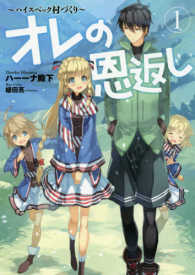- ホーム
- > 洋書
- > 英文書
- > Philosophy
Full Description
Why do people wage war? How can wars be won? How has warfare been an engine of change for human civilization—for better and for worse? In this book Paul Schuurman shows how some of the best Western minds between 1650 and 1900 tried to answer these questions in an epoch when European developments became a matter of global concern. In eight wide-ranging chapters he discusses the key concepts that philosophers and generals of this era developed to grasp and influence the dramatic phenomenon of war. Their concepts remain fresh and relevant down to the present day.
Contents
Preface
List of Figures and Tables
Introduction
1 The Cat's Grand Strategy Pieter de la Court on Holland and the Challenges and Prospects of Free-Riding Behaviour during the General Crisis of the Seventeenth Century
1 Introduction
2 Commerce and Compromise
3 Historical Context: Change and Crisis
4 Game Theory
5 Holland and Europe: the Opportunities of Free-Riding
6 Holland and the Other United Provinces: the Challenges of Free-Riding
7 Philosophical Context: Hobbes and Spinoza
8 Conclusion
2 François Fénelon on Luxury, War, and Trade in the Telemachus
1 Introduction
2 Telemachus
3 Boetica
4 Salentum: Luxury and War
5 Salentum: Commerce
6 Mercantilism
7 Quietism
8 Self-interest
9 Evaluation
3 'The Effect in Turn Became the Cause' Determinism and Causal Feedback Loops in Montesquieu's Explanations for the Military Rise and Fall of Rome
1 Introduction
2 Determinism and Contingency at the Meso-Level
3 Process Explanations
4 Military and Political Context
5 Philosophical and Historiographical Context
4 Carl von Clausewitz on Limited War: a Three-Stage Interpretation
1 Introduction
2 Interaction and Holism
3 Friction
4 Suspension
5 Politics
6 Discussion
5 What-If at Waterloo: Clausewitz's Use of Historical Counterfactuals in his History of the Campaign of 1815
1 Introduction
2 Description: the Waterloo Campaign in 25 Counterfactuals
3 Analysis of the Function of Counterfactuals in the 'Campaign of 1815'
4 Context: On War
5 Context: Military History in General
6 Models of War 1770-1830: the Birth of Wargames and the Trade-Off between Realism and Simplicity
1 Introduction
2 Wargames 1770-1830: Types and Functions
3 Historical Background: Peace and War and Peace
4 Trade-Off between Realism and Simplicity
5 The Realism-Simplicity Trade-Off and Chance
6 Discussion: Empire of Chance?
7 Conclusion
7 Preparing for War: Prussian-German Professional Wargames and the Leadership Concept of Mission Tactics 1870-1880
1 Introduction
2 Prussian-German Wargames 1870-1880
3 Wargames and Mission Tactics
4 Wargames and Mission Tactics: Incubation, Rifles, and Railways
5 Conclusion
8 Herbert Spencer and the Paradox of War
1 Introduction
2 The Function of War: before Spencer
3 Spencer on the Function of War
4 Biological Evolution: Two Mechanisms
5 Evolution of the Militant and the Industrial Type: the Same Two Mechanisms
6 The Function of the Militant/Industrial Typology
7 Evaluation
Bibliography
Index








